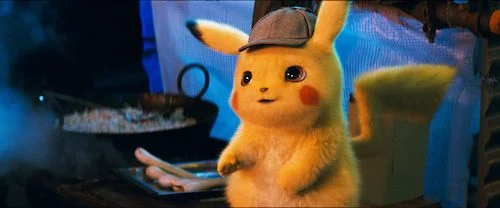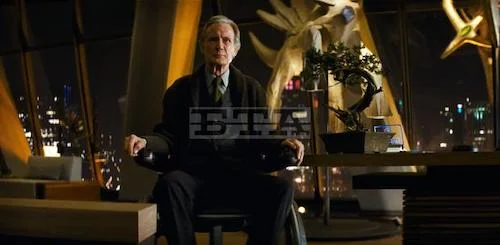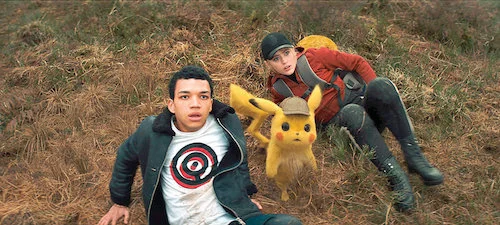Pokémon Detective Pikachu
Is… is this a good video game film? Did it actually happen? It sure did. Look, it’s no masterpiece, but I think Pokémon Detective Pikachu cracked the code when it comes to making a good film adaptation of a video game: simply do not care about non fans. In an article I wrote the other day, I questioned if a fandom-based film deserves to be critically ripped apart if a writer has no involvement with the fandom. There was a grey area: critique the filmmaking aspects, but not the mysteries of the fandom you are disassociated with. Why is the plot derivative? That’s the film’s fault. Why does this character do something they may or may-not be able to do in every other iteration of the fandom? That may be on you. Think of it like you’re watching Endgame without having seen any other Avengers related film. Why is this any different?
Instead of trying to appeal to every single person on earth, Detective Pikachu knows it’s a Pokémon film, and it owns it. You might not understand why those purple creatures (Loudred) are at the DJ booth; players of the game know they are sound-based Pokémon that are basically replicating a sound system in Ryme City (Flintstones style). Those tiger-dogs sure are everywhere. Well, Growlithe are well known to be authoritative canine figures in the games and shows (especially by police officers). The film doesn’t employ many battle mechanics, so there isn’t a whole lot of mystery surrounding the physical fighting (no weakness-based damage, stat boosting, or anything); if someone unfamiliar with the franchise stumbled upon the film, at least the fighting will make a bit of sense.
Call him Pika Pika Gittes: the titular electric mouse inspector on the case early in the film.
If Detective Pikachu only cared about appealing to fans with its realistic depiction of Pokémon (a two decade dream), it would have failed. Where it succeeds, is that it does genuinely try to make a true neo noir homage. It’s no Roger Rabbit, but it sure starts out in a way that is (dare I say) darn near similar. We get an established story: Tim Goodman used to be a trainer, until familial issues got in the way (mainly neglect from his father, who seemingly put Pokémon first). Once his father is reported dead in the line of duty (a police officer having been killed at the scene of a crime), Tim goes to Ryme City: a destination where Pokémon do not battle, and they live side-by-side with humans. He discovers a Pikachu with the ability to communicate to him (and only him). This Pikachu insists that his father is still alive. We’ve got a noir film on our hands!
There are a few drawbacks. Firstly, is it a problem that the film’s logic depends on your knowledge of Pokémon? No, but it does kind of get in the way of following the footsteps. For instance, interrogating Mr. Mime is a barrel of laughs, but his type of tomfoolery only exists within that scene. What if a Snorlax were interviewed? It would be asleep the entire time, but likely with the same results. In Roger Rabbit, every cartoon character still operates with the same properties, so each circumstance felt a part of the whole, rather than a singular one-off moment. It isn’t a major problem, especially since the Mr. Mime scene is actually a clever spoofing of many noir and crime scenes of a similar nature. Yet, it does cause a bit of a tonality issue. Luckily, Justice Smith and Ryan Reynold’s strong chemistry sees us through these moments.
Howard Clifford: creator of Ryme City.
The second problem is how unbelievably predictable Detective Pikachu is. It’s almost to the point that you may not even see moments as twists, but just developments. Once you begin to understand how certain plot threads are shaping up, you may be able to guess the heart wrenching final cherry on top; it won’t make it any less touching, but you are almost guaranteed to see it coming. For other styles of films, it isn’t a big issue. With Detective Pikachu, half of the fun of the first act was being dropped into a modern neo noir film for families. Part of that thrill is the guessing-game that comes with the film. Roger Rabbit may have had some obvious twists, but you also felt like you were a part of a much stronger world-combining event.
Aside from those issues, Detective Pikachu was actually the first time a video game film hasn’t left me with a migraine. Ever. It wasn’t boring (like some of the better adaptations), or vomit inducing (like some of the worst ones). It moves pretty quickly, but not idiotically. You still have story structure of some sort. I almost wish there was more. More destinations the investigative duo had to go to. More witnesses (as long as their moments didn’t feel of their own ilk, and were a part of the whole). More events. The protagonists aren’t idiots or anything: they pick up on everything very quickly (including a young reporter-intern named Lucy Stevens, who is already hot on the trail to something big by the time Tim gets involved).
Tim, Pikachu, and Lucy having a shocking revelation about the world around them.
I guess that’s why I have a slight Cubone to pick with these one-off situations. When you start to see the gigantic capabilities at hand, you wish you could spend more time there. See more of an impact outside of each scene. Robert Letterman at least downsized the amount of Pokémon in Ryme City, so you’re never inundated with wasted opportunities (we see roughly less than one hundred, and a good chunk of them aren’t even the original 151). Still, Detective Pikachu could have been even longer. More clues. More downtime. The feel of the film is so quick, we could have easily done with another twenty minutes or so.
All of that aside, it feels good to finally not have to desecrate a video game film. Detective Pikachu knows it’s for Pokémon audiences, so there’s no beating around any bushes. Besides, who would have thought that a major complaint for a video game film is that there wasn’t enough? Isn’t the usual concern that there’s just too much? On that note, it’s surprising how Ryan Reynolds’ Pikachu is a pop-culture spewing rodent (including a Seinfeld reference, of all things) who never turns off, and yet I personally did not get tired of him the entire time. We’ll never know what a Danny DeVito version would be like, but Reynolds’ heart was clearly in the right place, and I most certainly do not mind that we got this sarcastic-yet-sincere rendition instead.
Detective Pikachu is funny, smart enough, and heartfelt. It’s mostly enjoyable. With some editing clean up during some of the action moments, and maybe a bit of CGI touching up with some of the scenes, it can be even better. Who knows. Maybe most of these issues are time related: Warner Bros. not being fully invested in a Pokémon film, but they will grant this opportunity. We finally have seen the possibility of this kind of thing being great. Who knows if Detective Pikachu will get a sequel (or how it will work), but now that we’ve had a glimpse of silver and gold, who knows. Maybe the next project by this team will be the time a video game film goes platinum.
Andreas Babiolakis has a Masters degree in Film and Photography Preservation and Collections management from Ryerson University, as well as a Bachelors degree in Cinema Studies from York University. His favourite times of year are the Criterion Collection flash sales and the annual Toronto International Film Festival.







